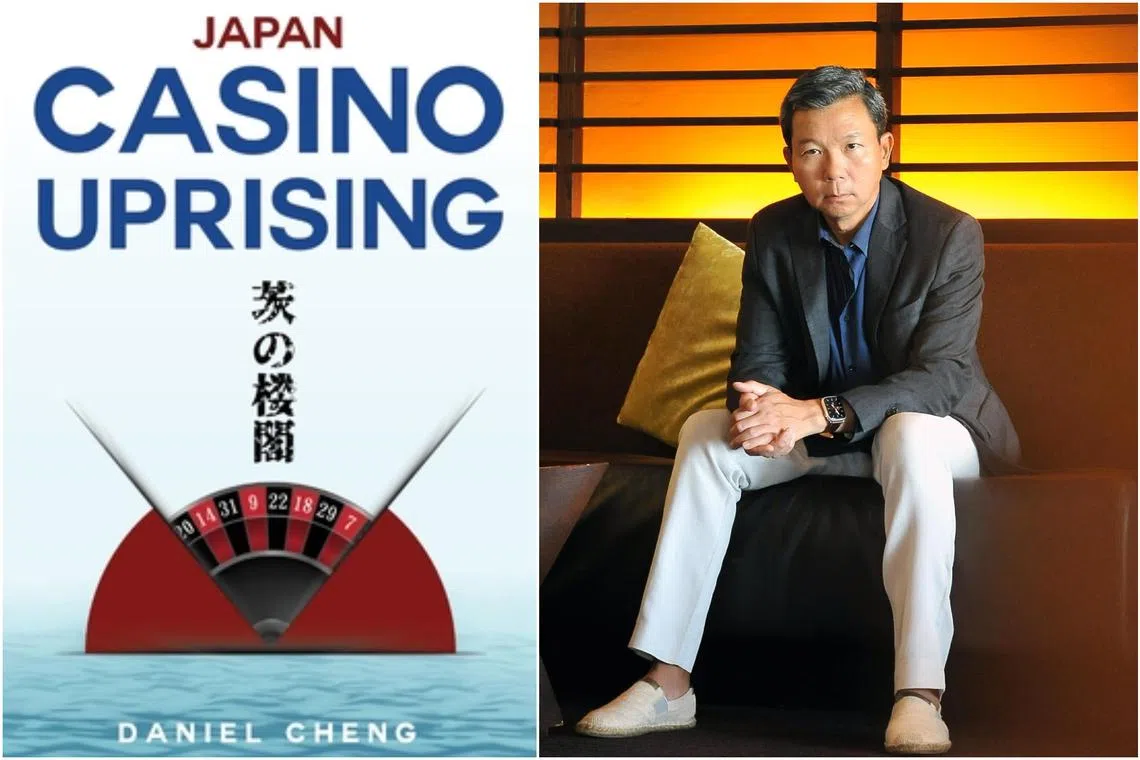Book review: Japan Casino Uprising a sharp socio-political commentary on its derailed integrated resort dreams
Sign up now: Get ST's newsletters delivered to your inbox

Writer Daniel Cheng follows Japan's stop-start attempts to introduce integrated resorts in Japan Casino Uprising.
PHOTOS: COURTESY OF DANIEL CHENG, FK WONG
Follow topic:
Japan Casino Uprising
By Daniel Cheng
Non-fiction/Self-published/Paperback/344 pages/$49.05/ Books Kinokuniya
A “warm-up” project to a Japan property.
That was how the late mogul Sheldon Adelson
Yet he would pull his company out of the running for an integrated resort (IR) in Japan, which industry watchers once touted as having the potential to leave Singapore in the dust.
You may ask: Casinos? IRs? Why should anyone care?
But Singaporean writer Daniel Cheng, an insider of the IR trade, turns an esoteric topic into a very readable sojourn into Japan’s moribund IR ambitions – and, above that, a road trip into the Japanese psyche with his astute observations of how the country does politics and business.
That, in itself, makes Japan Casino Uprising – Cheng’s second book after the fictional debut The Rainbow Upopo – which is set in Hokkaido and an homage to the indigenous Ainu people
Cheng is worth his salt. He was an engineer for 15 years with a Japanese company before venturing into the gaming and hospitality industry, where he is now a veteran with more than two decades of experience.
His front-row-seat observations are laid out over 31 chapters as he follows Japan’s stop-start attempts to introduce IRs.
The Japanese subtitle Ibara no Roukaku (茨の楼閣) translates as “tower of thorns”, and this is an apt metaphor for a minefield of self-inflicted obstacles that has derailed IR investor interest in Japan.
It has been 20 years since the idea was first mooted, but not a single stone has been laid.
Cheng remembers sitting in government meetings in Japan’s bureaucratic nerve centre of Kasumigaseki as a gaming and hospitality consultant – meetings that he recounts in a tone nearly dripping with exasperation at the sheer inefficiency.
One example was language, and he cites the still prevalent irony that business documents and communication that are geared towards a global, decidedly un-Japanese target audience are available only in Japanese.
The IR has become global parlance thanks to Singapore, which coined the term to show how MBS and Resorts World Sentosa (RWS) are, really, not just about their casinos. Instead, these are mega complexes that also have hotels, shopping malls, entertainment facilities and exhibition spaces.
Scores of Japanese policymakers, including the late former prime minister Shinzo Abe, lured by the promise of a tourism windfall, have made trips to Singapore to visit its two IRs and study the gambling safeguards in place.
And mention “Singapore” to any Japanese, and chances are that top of their mind will either be the Merlion or MBS, such is the latter’s architectural prominence – though no doubt aided by a decade-old commercial by now-defunct boy band Smap.
Yet IRs are staunchly unpopular in Japan, and would not have taken flight if not for Mr Abe’s ruling party’s numbers in the Diet, or Japan’s Parliament, en route to becoming Japan’s longest-serving prime minister. This allowed him to, essentially, ramrod home unpopular legislation.
Even then, the ongoing opposition beggars understanding.
Critics cite a fear of gambling addiction – which can be curtailed by introducing safeguards – and yet say nothing about the ubiquitous pachinko pinball parlours that litter the country, a dangerously ruinous gambling titan that is not officially regarded as “gambling”.
It was against this backdrop that the passage of the IR law won euphoria among investors.
Cheng describes in a particularly colourful anecdote: “A few would mark the occasion by skinny-dipping in the pitch-black hotel pool before being chased out by security staff, but not before one chipped a tooth and another dislocated a finger from the escapades.”
But their world would soon come crashing down in a turn of events that, Cheng argues, was caused by a toxic mix of fractured politics, social issues and, perhaps, most damagingly, inefficient lawmaking leading to ill-thought-out and unfeasible rules.
This has impaired an industry that could well enrich the debt-laden Japanese economy.
While there had been avid interest from regions such as Yokohama Hokkaido
Hopes were once rife that Japan could open its first IR in Osaka in time for the World Expo that the city will host in 2025. But it will not be until the turn of the decade – at the earliest – when the first IR opens for business.
“A virgin casino market with so much promise only five years earlier, and which was widely touted to put Singapore in the shade, was perilously vitiating into a damp squib,” Cheng says.
In setting the stage, Cheng looks at how regions from Malaysia to Macau came to have casinos, as well as how Singapore’s two IRs had been planned and built. This is interspersed with sharp though sometimes overblown social commentary about Japan on tangential issues such as immigrant deaths (“something out of a poor third-world banana republic”).
Although he offers some potent suggestions to Japanese policymakers on a possible face-saving way forward, he notes: “Whenever political headwinds strike, the IR process goes into park mode and the agenda is taken off the Diet session.”
With Prime Minister Fumio Kishida’s Cabinet approval ratings in the doldrums
If you like this, read: The Rainbow Upopo by Daniel Cheng (Self-published, 2021, $26.30, Books Kinokuniya


